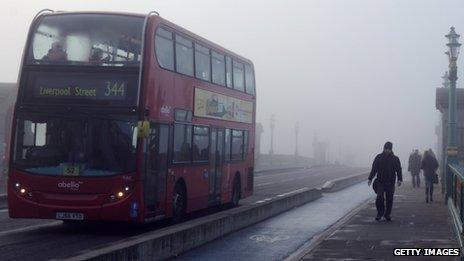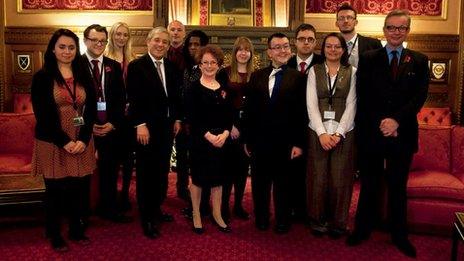Bus driver-magistrates 'point way to working class participation'
- Published

Urgent action is needed to boost working class participation in public life, including the expansion of a scheme which saw bus drivers working as magistrates, a think tank has said.
A report by Policy Exchange, external also argued for more manual workers serving as school governors and on NHS bodies.
"It is shameful that working class communities are being excluded," report author Michael Pinto-Duschinsky said.
Employees have the right to ask for time off for various public duties.
But there is no obligation on their employers to pay them while they are off work, in contrast to statutory holiday entitlement.
"The prevailing rhetoric of diversity tends to be skewed," the report said. "It rightly promotes the case for gender and ethnic equality but fatally neglects social equality."
Dr Pinto-Duschinsky explained: "It is vital for a functioning democracy that all its citizens are represented in public life, no matter their background, colour or gender.
"Action to encourage individuals in manual occupations should not be in the form of quotas or statistical 'targets'.
"Rather, there should be special schemes to help those in manual occupations to apply for roles and to persuade employers to grant time off to carry out public duties."
'Unique opportunity'
The report praised bus company Go-Ahead London and the Magistrates Association for teaming up to encourage bus drivers to become magistrates.
Being a magistrate is unpaid, although expenses and some allowances are available from public funds.
But the company pays staff in full for time taken off during normal working hours to be a magistrate, and now benefits from "more well rounded and experienced" employees who were more loyal and had higher morale, the report said.
"The magistracy offers a unique opportunity for the judiciary to engage with those in routine and manual occupations, or the 'traditional working class', as magistrates are volunteers and do not need to achieve legal qualifications or a particular career level," it added.
It also praised campaign group Operation Black Vote's Magistrates Shadowing Scheme, established in 2001, which it said had aimed "to redress the balance between those who are subject to the courts and those who are represented within it".
The report concluded: "It is strongly recommended that similar schemes are organised to encourage individuals from manual occupations, regardless of race, gender and disability, to put themselves forward for positions as magistrates, members of employment tribunals, school governors and other similar public roles."
It said major employers needed to get behind schemes to involve working class people involved in public life.
"This is because workers who become magistrates need agreement from their employers to take the necessary time off from their work," it added.
"Against the background of public expenditure cuts, there will be limits on the amount of public funding that can be expected for organisations carrying out such initiatives.
"It is not the intention that initiatives with a focus on those in manual occupations should substitute for those that focus on women, minority ethnic groups and the disabled. They should be additional to them."

A scheme backed by Speaker John Bercow (centre-left), Labour ex-minister Hazel Blears (centre) and Conservative Education Secretary Michael Gove (right) recently recruited ten paid interns to work in Parliament
Employers organisation the CBI has recently called for an extension of the right to time off work to be a school governor.
"It's such a fundamentally important issue that business is happy to extend the obligation for firms to release staff for governor duties to be widened to academies and free schools," Neil Carberry, CBI director for employment and skills policy, said.
In response to the proposals in the Policy Exchange report, he added: "Many employers do effectively pay for that time by leaving salaries unchanged, but it has to be voluntary, as many smaller firms couldn't afford to pay."
Labour MP for Salford and Eccles Hazel Blears, who launched a scheme in 2011 designed to recruit paid parliamentary interns from poorer backgrounds, said: "Everyone should have the same opportunities in life, regardless of where they come from."
She said she had seen the participants in her intern scheme, which is supported by MPs from both sides of the House, "really flourish".
"The kind of initiatives suggested in this report could enable many more working class people to apply for public office," Ms Blears concluded.

Clark Vasey, from the Blue Collar Conservatism group which aims to boost the appeal of David Cameron's party among working-class voters, said: "Representation based upon ability will allow talented people whether they work in a factory, a shop or drive a bus to take on leadership roles within their communities and bring a real understanding of the needs of that community.
"Under the last Labour government social mobility fell and it is important that we act to increase opportunity and public involvement.
"The Conservatives are best placed to extend opportunity and increase diversity of backgrounds by empowering working class people to improve their own lives and ultimately their communities."
Labour's deputy chairman Jon Trickett, who worked as a builder and plumber before entering politics, has been tasked by Ed Miliband with boosting the number of working class candidates for Labour at the next election.
He said: "People are more likely to connect with and engage in public life and in politics if they see it as something done by people who look and sound like them.
"It is a matter too of central concern to our notion of a One Nation Labour Party. We are proud of the fact that our party's roots lie in all communities in Britain.
"We recently extended our objectives in terms of candidate diversity explicitly to increase a reference to class, as well as gender, sexuality, disability and ethnicity."
- Published28 October 2012
- Published9 November 2011
- Published25 July 2012